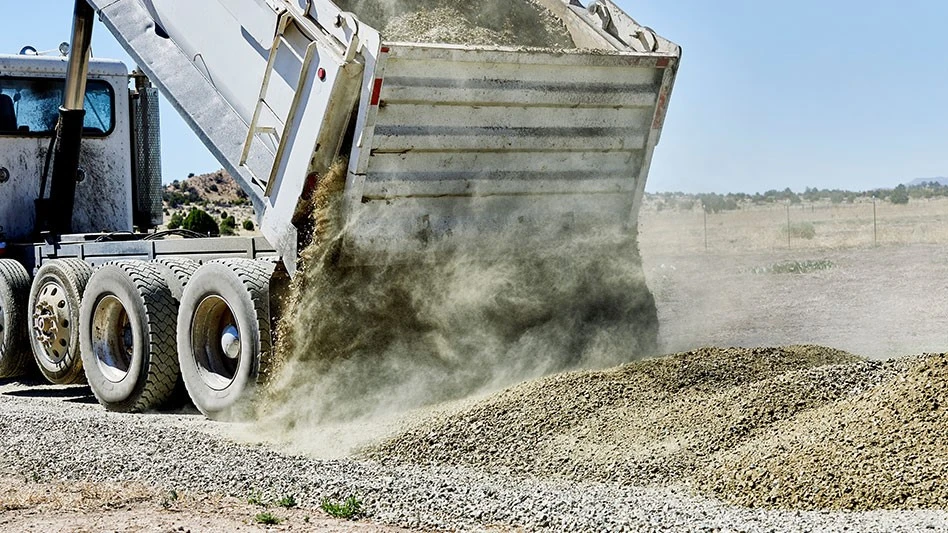
Pamela Au | stock.adobe.com
In September, California Gov. Gavin Newsom signed a bill designed to increase the use of recycled materials in road construction projects. Once the bill takes effect in 2024, contractors and construction and demolition (C&D) recyclers could reap various benefits the landmark bill offers.
The bill (AB 2953) will require local municipalities and other agencies with jurisdiction over a street or highway—to the extent feasible—to apply standard specifications that allow for the use of recycled materials in new or repaved roadways. Those materials include reclaimed asphalt pavement (RAP), recycled base and subbase materials, reclaimed aggregate and more.
“It requires local governments in California to have specifications that are as accepting or better than the [California Department of Transportation’s] specifications for recycled construction materials,” says Charley Rea, director of communications, safety and technical services for the California Construction and Industrial Materials Association (CalCIMA).
CalCIMA is the state trade association for aggregate, concrete, asphalt and industrial mineral producers that provide materials for various construction projects in California. CalCIMA says it backed the bill to increase the recycling of construction materials to conserve natural resources, maximize recycling and reduce emissions.
Under the new law, cities must substitute virgin aggregate for RAP in a quantity of up to 25 percent of the overall aggregate blend. For RAP substitution of 15 percent or less, the grade of the virgin binder must be the specified grade of asphalt binder for Type A hot mix asphalt (HMA).
For RAP substitution greater than 15 percent but not exceeding 25 percent, the grade of the virgin binder must be the specified grade of asphalt binder for Type A HMA with the upper and lower temperature classification reduced by 6 degrees Celsius.
Aggregate subbases and bases may contain any combination of materials, such as broken stone, crushed gravel, natural rough-surfaced gravel, sand or processed reclaimed asphalt concrete.
Small cities with populations of 25,000 or less and counties with 100,000 or less are exempt from these requirements. The bill also will not require any city or county to use recycled materials where those materials are not readily available or are too costly.
“Hopefully, this spurs more use of recycled materials,” Rea says. “Right now, there’s still about 600,000 tons of concrete a year that go to landfills. This will encourage cities to use recycled materials and divert some of that material away from the landfill.”
CalCIMA says the bill will expand the recycled aggregate market in the state because more cities will be required to use RAP in road construction programs. This has the potential to place downward pressure on costs, resulting in a more competitive marketplace.
Rea adds that since RAP will be required for road projects, demand will increase in the state, enabling C&D recyclers to sell more material, requiring a boost in supply.
Additionally, the bill will increase the efficiency of road construction projects. Because contractors will be allowed to use RAP for certain projects, they could recycle demolished roads on the spot and process their debris for new material on the same site. This will lead to a decrease in material extraction costs, transportation costs and downtime.
“This is going to have a positive impact on C&D recyclers,” Rea says. “The more we can break down the barriers where this material is not allowed, it just makes it that much better understood as a viable material and expands the market.”
According to a statement the Construction & Demolition Recycling Association sent to its members, the bill is the most aggressive push by a state government to use recycled materials on its roads. By driving the demand side, the association says the bill provides a better way to increase recycling rates in the long run than passing disposal bans.
“The passage of this legislation is a key component of the California construction and essential mineral producers’ efforts to reduce the carbon footprint of construction in the state by ensuring the maximum use and reuse of resources,” CalCIMA President and CEO Robert Dugan says.
Get curated news on YOUR industry.
Enter your email to receive our newsletters.Latest from Construction & Demolition Recycling
- US Senate backs reduced cuts to EPA
- US EPA offers brownfields-related funding
- Sky Quarry seeks crowdfunding support
- Caterpillar releases the new Cat 980 GC Wheel Loader
- NAPA leaders participate in USDOT roundtable
- Yanmar CE launches full line of compact equipment
- Metso reports increased orders after flat H1
- Block Island Recycling Management Inc. aims to promote environmental stewardship






